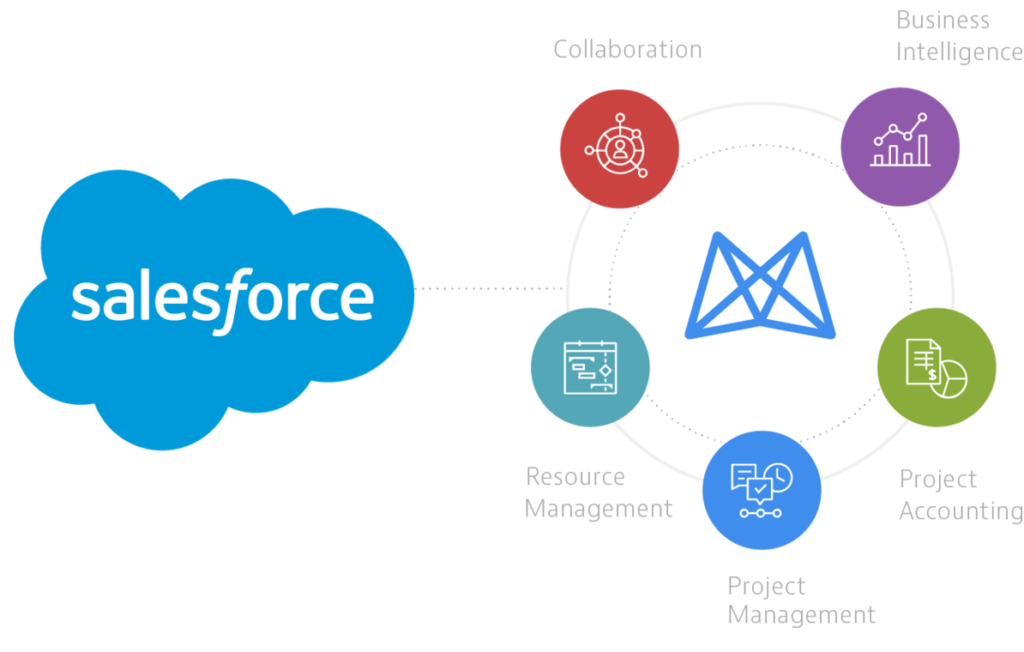
Introduction to CRM Salesforce and Cloud Computing: Transforming Business Efficiency
In today’s digital landscape, businesses are increasingly turning to advanced technologies to streamline operations, enhance customer relationships, and drive growth. Two pivotal innovations that have revolutionized business practices are Customer Relationship Management (CRM) systems and cloud computing. Among CRM solutions, Salesforce stands out as a leading platform, offering a robust suite of tools to manage customer interactions and business processes. This blog will introduce you to Salesforce CRM and explore how cloud computing complements its capabilities, providing a powerful combination for modern businesses.
What is CRM?
Customer Relationship Management (CRM):
CRM stands for Customer Relationship Management. It refers to a strategy and technology used to manage a company’s interactions with current and potential customers. A CRM system centralizes customer data, tracks interactions, and automates various sales and marketing processes to improve customer service, increase sales, and foster stronger relationships.
Key Functions of CRM Systems:
- Contact Management: Store and organize customer information, including contact details, communication history, and purchase records.
- Sales Management: Track sales opportunities, manage leads, and monitor sales performance.
- Marketing Automation: Automate marketing campaigns, track customer engagement, and analyze campaign effectiveness.
- Customer Support: Manage customer service requests, track issue resolution, and provide support through various channels.
- Analytics and Reporting: Generate insights through data analysis, helping businesses make informed decisions and optimize their strategies.
Introducing Salesforce CRM
Overview:
Salesforce is one of the world’s leading CRM platforms, known for its comprehensive suite of tools designed to help businesses manage their customer relationships and operations effectively. Founded in 1999, Salesforce has grown to become a cloud-based CRM powerhouse, serving millions of users globally.
Key Features of Salesforce:
- Sales Cloud:
- Lead and Opportunity Management: Track sales leads, opportunities, and pipeline stages.
- Sales Forecasting: Predict future sales and set targets based on historical data.
- Service Cloud:
- Customer Support: Manage customer service cases, provide support through multiple channels, and track service performance.
- Knowledge Base: Create and manage a repository of articles and resources to assist both customers and support agents.
- Marketing Cloud:
- Campaign Management: Design, execute, and analyze marketing campaigns.
- Customer Journeys: Automate customer interactions and personalize messaging based on behavior and preferences.
- Commerce Cloud:
- E-Commerce Solutions: Manage online sales, product catalogs, and customer transactions.
- Omnichannel Experiences: Provide a seamless shopping experience across various channels.
- Analytics Cloud (Tableau CRM):
- Data Visualization: Create interactive dashboards and reports to visualize business performance.
- Advanced Analytics: Utilize advanced analytics tools to gain deeper insights from your data.
- AppExchange:
- Marketplace for Apps: Access a vast marketplace of third-party apps and integrations to extend Salesforce’s functionality.
How Cloud Computing Enhances Salesforce CRM
Cloud Computing:
Cloud computing refers to the delivery of computing services over the internet. It enables businesses to access and use technology resources such as servers, storage, databases, and software on a pay-as-you-go basis. Cloud computing offers several benefits, including scalability, cost-efficiency, and accessibility.
Benefits of Cloud Computing for Salesforce CRM:
- Scalability:
- Elastic Resources: Cloud computing allows Salesforce to scale resources up or down based on demand. This ensures that businesses can handle fluctuating workloads without investing in physical infrastructure.
- Global Reach: Access Salesforce from anywhere in the world, enabling remote work and global collaboration.
- Cost-Efficiency:
- Subscription-Based Model: Salesforce operates on a subscription-based pricing model, eliminating the need for large upfront investments in hardware and software.
- Pay-as-You-Go: Pay only for the resources you use, reducing overall IT costs.
- Accessibility:
- Anytime, Anywhere Access: Cloud-based Salesforce can be accessed from any device with an internet connection, providing flexibility for users to work from different locations.
- Real-Time Collaboration: Teams can collaborate in real-time, share information, and update records simultaneously, enhancing productivity.
- Automatic Updates:
- Seamless Upgrades: Salesforce’s cloud infrastructure ensures that updates and new features are automatically applied, reducing the need for manual installations and maintenance.
- Enhanced Security:
- Data Protection: Cloud providers, including Salesforce, invest heavily in security measures to protect data from breaches and unauthorized access.
- Backup and Recovery: Cloud computing offers robust backup and disaster recovery solutions, ensuring data integrity and availability.
Getting Started with Salesforce CRM and Cloud Computing
**1. *Explore Salesforce’s Offerings:*
- Free Trial: Start with a free trial of Salesforce to explore its features and understand how it aligns with your business needs.
- Consultation: Consider consulting with Salesforce experts or partners to tailor the platform to your specific requirements.
**2. *Leverage Cloud Computing:*
- Cloud Strategy: Develop a cloud strategy that aligns with your business goals and ensures a smooth transition to cloud-based solutions.
- Training: Invest in training for your team to maximize the benefits of Salesforce and cloud computing.
**3. *Integrate with Other Tools:*
- APIs and Integrations: Utilize Salesforce’s integration capabilities to connect with other tools and systems used in your organization, such as ERP systems, marketing platforms, and financial software.
Conclusion
Salesforce CRM, combined with the power of cloud computing, offers a transformative approach to managing customer relationships and business operations. With its extensive features and cloud-based advantages, Salesforce provides a scalable, cost-effective, and accessible solution for businesses of all sizes. By leveraging the capabilities of Salesforce and cloud computing, organizations can enhance their customer interactions, streamline processes, and drive growth in today’s competitive landscape. Embrace the future of CRM and cloud technology to unlock new possibilities for your business.
Leave a Reply